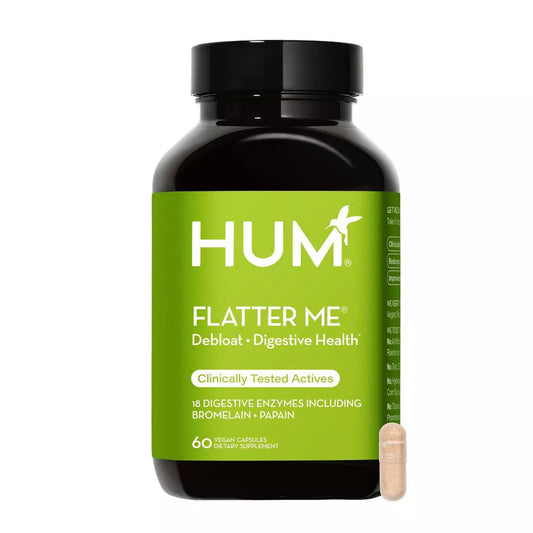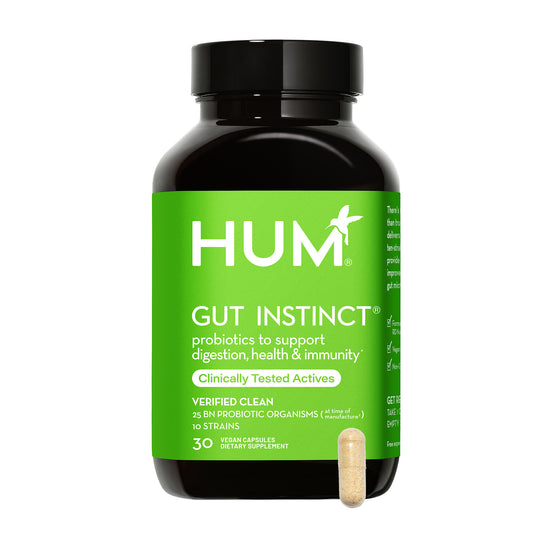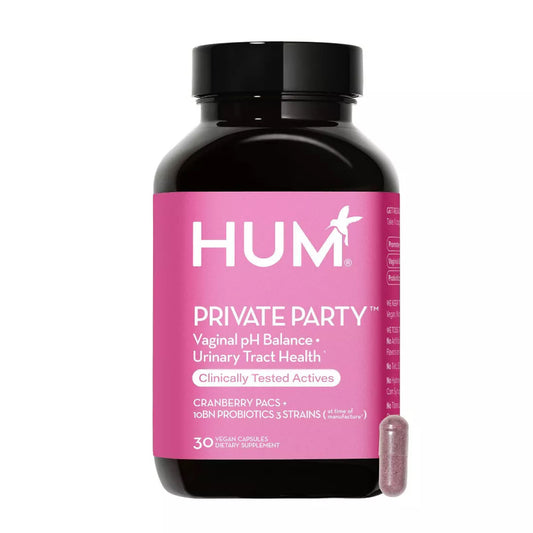As the weather gets cooler and the days become shorter, it's a great time to enjoy the season's harvest and support your health during menopause. Fall brings a bounty of nutrient-rich fruits and vegetables that may help alleviate common symptoms, balance hormones, and support your health. Here are 5 fall foods that can be powerful nutritional allies during your menopause transition.
Also talk to your doctor before making any changes to your diet.
What foods are good for menopause?
Pumpkins
Pumpkins are a nutrient-dense food that can offer significant benefits for those going through the menopause journey. Pumpkin is rich in beta-carotene, which the body converts into Vitamin A. Vitamin A is important for skin health. It helps cells regenerate and fights dryness and thinning of the skin, including during menopause.
This antioxidant also helps the immune system and fights inflammation. This may help reduce the intensity of menopause symptoms like hot flashes and joint pain.
Pumpkin seeds, or pepitas, are equally beneficial, especially because of their high magnesium content. Magnesium is a key mineral for those in menopause. It may help with hot flashes during menopause. Studies have shown that magnesium can also help reduce stress. For some people during the menopause transition, cortisol levels often go up during menopause because of hormonal imbalances.
Pumpkin seeds are also a good source of plant-based protein, fiber, and healthy fats. These help you feel full, help with digestion, and help you lose weight when your metabolism slows down.
Here are some delicious and effortless ways to add pumpkin and pumpkin seeds into your daily diet:
- Breakfast: Add pumpkin puree to your oatmeal or smoothie. Use almond milk, protein powder, cinnamon, and nutmeg for a delicious fall flavor.
- Lunch: Roast pumpkin cubes with olive oil, salt, and pepper. You can add them to salads, grain bowls, or quinoa. They add extra fiber and antioxidants.
- Snack: Roast pumpkin seeds for a crunchy, magnesium-rich snack or sprinkle them over yogurt and berries.

Apples
Apples are a powerhouse fruit for people who are going through menopause. They have many health benefits that help with this stage of life.
Apples have a lot of fiber, especially pectin, which is a soluble fiber. This helps control blood sugar levels, which is important for maintaining energy and preventing insulin resistance.
Insulin resistance is a common concern for people who are approaching menopause. Fiber also aids digestion, reducing bloating and promoting regularity and may help to lower LDL cholesterol levels.
Apples also contain quercetin, a powerful antioxidant known for its anti-inflammatory properties. Antioxidants may help lower the risk of heart disease, which is more likely after menopause. Fiber and antioxidants promote good health, in general, including cardiovascular and cognitive health.
Here are some delicious and easy ways to add apples to your daily diet:
- Breakfast: Add chopped apples to your overnight oats or add slices to Greek yogurt with a sprinkle of cinnamon. This can give you a fiber-rich beginning to your day.
- Lunch: Add thinly sliced apples to salads with walnuts and goat cheese, or pair them with peanut butter for a satisfying snack.
- Dessert: Bake apple slices with cinnamon and a touch of honey for a warm, comforting, and antioxidant-packed dessert.

Sweet potatoes
Sweet potatoes are a great choice for people going through menopause. They're packed with nutrients that support overall health and help ease symptoms caused by hormonal changes.
Sweet potatoes are high in beta-carotene and are a good source of vitamin A. Vitamin A helps your skin stay healthy. It helps new skin cells grow and keeps your skin from becoming too dry or thin, which can happen during menopause.
This antioxidant also plays a key role in helping the immune system work well. It helps the body fight inflammation and oxidative stress. These can worsen menopause symptoms like joint pain, mood swings, and fatigue.
Sweet potatoes are packed with fiber and complex carbohydrates, which help maintain steady blood sugar levels. This is especially important in perimenopause and menopause. Changes in blood sugar can lead to mood swings, energy crashes, and weight gain. A diet rich in fiber also aids digestion, combats bloating, and promotes satiety, making it easier to manage weight during this transitional phase.
Sweet potatoes also have a lot of vitamins C and E. These vitamins help skin health by making more collagen and protecting the skin from damage. This helps to reduce visible signs of aging, like wrinkles and fine lines.
Here are some delicious and easy ways to add sweet potatoes into your daily diet:
- Breakfast: Make sweet potato hash by sautéing cubed sweet potatoes with spinach and eggs for a balanced, filling breakfast.
- Lunch: Roast sweet potatoes and use them as a base for grain bowls. Top with lean protein like chicken or chickpeas, and drizzle with tahini.
- Dinner: Swap regular fries for baked sweet potato fries, seasoned with paprika and garlic. Or you can use mashed sweet potatoes as a side for your evening meal.
Brussels sprouts
Brussels sprouts are little green powerhouses that offer numerous benefits for those in the menopause transition. These cruciferous vegetables are rich in compounds called glucosinolates, which support liver detoxification. This is particularly important during menopause as the liver plays a crucial role in metabolism and detoxification.
Brussels sprouts are also a great source of fiber. Fiber helps digestion and reduces bloating. It also helps control blood sugar levels, which is important for keeping energy steady and preventing insulin resistance during this stage of life.
Brussels sprouts are also high in vitamin K, a nutrient essential for bone health. As people go through menopause, their estrogen levels decrease. This can lead to bone loss and an increased risk of osteoporosis. Vitamin K helps to maintain bone density and strength, making it a vital part of a menopause-supportive diet. Additionally, Brussels sprouts contain antioxidants like vitamin C, which support collagen production and promote skin elasticity. This helps counteract the dry, thinning skin that often comes with menopause.
Here are some delicious and easy ways to add Brussel sprouts into your daily diet:
- Lunch: Shred raw Brussels sprouts and use them as a base for salads. Toss with olive oil, lemon juice, and sliced almonds for a crunchy, detoxifying meal.
- Dinner: Roast Brussels sprouts with olive oil, balsamic vinegar, and garlic for a simple, flavorful side dish. It can pair well with chicken, fish, or tofu.
- Snack: Make crispy Brussels sprout chips by separating the leaves, tossing with olive oil, and baking until crispy.

Pears
Pears are a great fruit during the menopause transition. They have many health benefits that can help with common symptoms. Pears are rich in soluble fiber, especially pectin. They support healthy digestion and regular bowel movements, which can become irregular during menopause because of hormonal changes.
The fiber in pears also helps regulate blood sugar levels, lowering the chance of insulin resistance, which is more common in midlife as estrogen levels decline. Keep your blood sugar stable to prevent common menopause problems like energy drops, mood swings, and weight gain.
In addition to their fiber content, pears are a great source of important micronutrients like vitamin C and copper. Vitamin C, a powerful antioxidant, supports collagen production, promoting skin elasticity and helping to counteract the dryness and thinning of skin that often occurs during menopause.
Copper is important for keeping energy levels and helping the body make red blood cells. This helps to fight fatigue, which is a common complaint during this phase of life. The antioxidants in pears may also help reduce joint pain and other inflammatory problems that can arise during menopause. This makes them a good addition to a menopause-supportive diet.
Here are some delicious and easy ways to add pears into your daily diet:
- Breakfast: Add sliced pears to your morning smoothie or mix them into oatmeal for a boost of fiber and sweetness.
- Lunch: Slice pears into a salad with arugula, walnuts, and a light vinaigrette for a refreshing, nutrient-dense meal.
- Dessert: Poach pears with cinnamon and ginger, then top with Greek yogurt for a naturally sweet, antioxidant-rich dessert.
Learn more about Jennifer Hanway and our other Versalie advisors.








